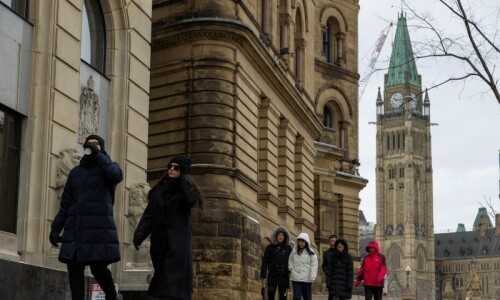PESHAWAR, May 13: Dhodial pheasantry, spread over an area of 168 kanals and 13 marlas in the scenic Hazara valley, provides a unique environment to 32 different types of beautiful and colourful pheasants, where they are sheltered.
Established in 1984 in Dhodial in the Mansehra district on the Karakoram Highway adjacent to the Hazara University, Dhodial pheasantry is also providing a breeding ground to tigers, Chinkara, Oryal and other protected animals for their subsequent reintroduction to their habitats.
The objective of breeding indigenous and exotic species of pheasants in captivity is to create awareness among the people and to provide opportunity for scientists and researchers to collect data to study their behaviour and sustainable conservation.
“Dhodial pheasantry is the biggest of its kind in Asia where 32 species of local and foreign pheasants are being kept, grown up and sheltered to save their race from possible extinction,” said Kamal, Divisional Forest Officer, Manshera.
Five species of pheasants, including Koklass, Monal, Western Tragopan, Kalij and Cheer, found in the outer Himalayas of Pakistan, were also bred at the pheasantry, he added.
The NWFP Wildlife Department had made elaborate arrangements for increasing the population of endangered Cheer pheasant, which was gradually getting extinct from its natural habitats, said DFO Kamal. He said concrete arrangement had been made for Cheer breeding to increase their population.
The official disclosed that 60 new pairs of Cheer had been bred at the pheasantry. As many as 40 new cages have been set up to protect and conserve rare pheasants.
“Dhodial pheasantry has attracted people from within Pakistan and the world,” said Kamal. NWFP Chief Minister Mohammad Akram Khan Durrani had also visited it and took keen interest in the pheasantry, he added. “Out of 52 species of pheasants found in the world, Dhodial has 32 and it makes it the Aisa's largest pheasantry,” he claimed.
The NWFP Wildlife Department managed the pheasantry, where about 250 cages were used to keep around 4000 birds safe, the Divisional Forest officer said.
The wildlife official said that pheasantry, besides maintaining its breeding stock, also gave birds to people on reasonable prices with an objective to bolster pheasant farming in the country.
The wildlife students and faculty members often visited it for research studies, he said, adding that the wildlife officers and staff regularly visited educational institutions and gave lectures to inform students about importance of pheasants and their role in food chain.
“We have set up an Information Centre at the pheasantary where tourists, students and wildlife lovers are given the first-hand information,” said DFO Kamal. The Centre was helping a lot in creating awareness among the local community and people visiting it in large number to the pheasantry, he added.
“Pheasants always attract me because of their exotic colours and beautiful voices,” Malik Rustam, who came from Lahore to visit the facility, told APP.
“Trepogan and Monal pheasants are my favourites,” he said.
He urged the government to expand the pheasantry so that new cages could be erected to accommodate more species of pheasants and to overcome shortage of space for the animal due to high reproduction rate.
He appreciated efforts of the NWFP Wildlife Department for maintaining the pheasantry.
Mr Kamal said that at least Rs30million were required for launching new projects, including pheasantry expansion, construction of new cages, repair of old cages, boundary wall construction and residential houses for wildlife officers and other staff.
He urged the government to appoint a full-time DVM doctor and wildlife officer for the Dhodial Pheasantry to use their services in case of emergency.
Pheasant farming had a big potential to increase income of the people. To achieve desired results, he said, the Frontier Pheasants Association (FPA) had been formed to mobilise the people to promote pheasant farming.
He lauded the keen interest of Dr Muhammad Mumtaz Malik, Chief Conservator of the NWFP Wildlife Department, for establishment and supervision of Dhodial pheasantry.—APP















































